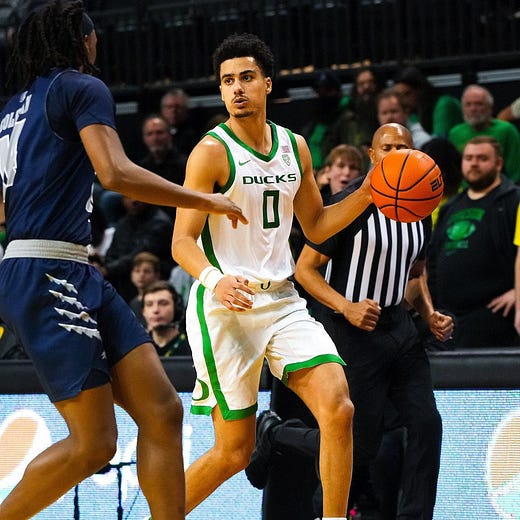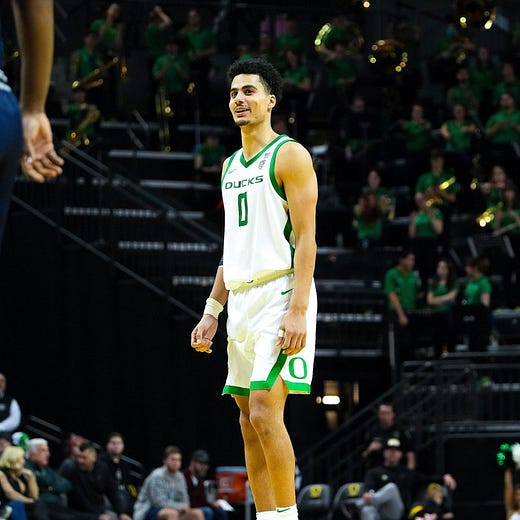The Oregon Ducks have found their life jacket in Will Richardson 5.0
The Ducks are still bruised, banged-up and injured. But at 5-5 with their toughest stretch of games behind them, the senior guard has kept Oregon afloat.
EUGENE — It's the first week of November, four days out from the Oregon men’s basketball season opener. The rain is coming and the injuries are piling up. As the Ducks’ afternoon practice concludes, Coach Dana Altman offers brief remarks, tinged with an air of agitation regarding the health of a roster he overhauled — again — throughout the summer and early fall.
The court clears of media and coaches and managers and players. Altman remains, slumped in a folding chair on the home bench, forward Quincy Guerrier taking up his left. Guerrier leans in close, absorbing the words of his coach, who, with his arms crossed and his hand rubbing his face, presents a mystified aura — no doubt the result of his team’s disjointed start.
The plane is falling apart before takeoff and Altman can only watch.
A few yards away, senior point guard Will Richardson, still adorned in practice gear and with his left thumb wound with medical tape, emerges from the tunnel.
He begins with an apology.
Richardson missed a scheduled phone interview that morning. He’s elusive, after all. The taciturn guard is removed from social media and his presence in front of the media scant until recently.
These days, much of his time is dedicated to treatment with team trainer Clay Jamieson. Usually it’s two or three hours a day, and even when it's not strictly rehab, he’s in there with him working on body maintenance: band work, stability training and stretching.
The state of Richardson’s body, now in the midst of its fifth year of college basketball, is a subject he’s broached all too often during his stint in Eugene. He’s been under the knife twice in the past few seasons. Once for his thumb, once for his ankle.
He starts tossing percentages around. Sixty, 75, 80? Whatever the number is, it’s clear it’s been suboptimal.
“I always rushed back because the team needed me,” he says. “I was always just there, but I haven't been 100 percent in like three years.”
But on this November afternoon, as the health of the roster around him atrophies, he’s getting back up to speed.
He admits he’s getting close.
Here on Dec. 14, Richardson has certainly looked like his athletic best. As Oregon (5-5) continues to weather one of the most injury-plagued starts in recent program history, the senior guard is dragging the Ducks to competence. He’s turning in career-highs in points (14.8), assists (5.8), rebounds (4) and shooting percentage (48.2).
He’s scored double-digits in all but two games this season and is averaging 19.2 over his last five. In Oregon’s last game, a 78-65 win over Nevada, he notched the first Oregon triple-double in 20 years, tallying 19 points, 11 assists and 10 rebounds in one of the finest outings of his career.
He’s done it all while serving as this team’s Iron Man, playing all but one minute in the Ducks’ last five games.
“He’s not always going to have these kinds of numbers, but it doesn’t matter,” Altman said recently. “Just keep competing and keep fighting and we get guys back and we’ll have a little better flow to things…
“I can't say enough about the transformation he’s made and the way he’s got guys playing.”
Assistant coach Mike Mennenga had a message for Richardson after senior night last season.
A floundering Ducks team narrowly lost 70-69 to No. 16 USC. The ceremony wasn’t conducted until after the game, when most fans had already departed Matthew Knight Arena. The crowd was slim, the applause soft.
“You deserve so much more,” Mennenga told Richardson.
Two games prior, Richardson had begun to feel the effects of mononucleosis, but the team kept it under wraps until after the season.
Richardson suffered a concussion, too. And between the head injury and illness, missed the final six games of Oregon’s season.
“Hell yeah (it messed with my play),” he said. “I was just weak. It makes your body weaker.”
He wanted to help the team, but couldn't physically play with the illness and had been battling headaches for nearly a month. But given his weeks long absence was listed as a non-COVID-19 illness, rumors swirled.
Richardson did his best to avoid the discourse.
“I live more in reality, I got a lot of shit,” he said. “I'm not one of those people who is gonna go home and look for somebody to pat me on the back and on social media.”
He added: “I'm definitely at peace now.… I talk to my dad a lot. He taught me that you just gotta learn that being a human is probably the toughest thing. It’s just full of hard decisions.”
The hardest decision of late for Richardson was the choice to return to Eugene for his final year. Hapless end of the season aside, the guard had four solid years of game tape already. He went through workouts with the Los Angeles Lakers among other teams, and said several offered him a two-way contract should he have entered the draft, but gone undrafted.
And yet:
“I'm not into what everybody else is into, not out here chasing much.”
The Ducks severely lacked on-court leadership and direction last season.
Coaches have mentioned the discrepancies in approaches and issues behind the scenes. Others around the team have alluded to a leadership void.
Rivaldo Soares just came out and said it.
“Last year we had the core, but as a group there wasn’t any leadership,” the forward said.
But in Richardson 5.0, the shorthanded Ducks have found their guiding force.
At a certain point, despite his nonchalant and hushed manner, Richardson’s resume was too strong to ignore, too strong for him not to be at the forefront of what this team is, and can become, when fully healthy.
He’s been a key contributor on multiple conference champions, an Elite Eight team, and a Sweet Sixteen group. He learned from a Bob Cousy award winner in Payton Pritchard, and a Jerry West award winner in Chris Duarte, among other pro Ducks.
Wherever he’s gone, winning has followed. Now, Richardson’s got a chance to go down as the winningest men’s player at Oregon ever.
“He’s like a basketball savant,” Mennenga said. “Really, really, really savvy basketball mind. I think when Will’s playing days are done. He'll be one hell of a coach… The game moves really slow for him.”
“He’s basically Altman Jr. on the court,” Soares added.
“Whatever he’s doing, it’s working,” center N’Faly Dante said.
Whatever he’s doing.
That’s the thing. Nobody can quite pinpoint where things have flipped. He’s speaking up, no doubt, but players are also looking to him more than in years past. And maybe he’s not the steely, rip-your-heart-out scorer Pritchard was, or the theatrically charismatic Dillon Brooks.
But it's working.
Players and coaches harp on leadership an inordinate amount. Not that it’s not important — it is. But it’s hard to quantify, and often the subject leads to buzz-wordy sayings, rather than any modicum of tangibility.
Yet the most tell-tale hint that something real is happening here, has been found in the words of Altman. It’s not easy to earn praise from the coach. Not without it being followed with a note on what still needs to be improved, at least.
The words he’s used to describe Richardson’s ascent are the type he’s previously reserved for the very best players who have come through Eugene.
In the span of a month, it’s gone from:
“He needs to take leadership. He knows what we’re trying to do… I think he can have a tremendous year for us, but it’s a team game. Now he’s got to bring his teammates along with him.”
To:
“I think he’s done as well leadership-wise as Eugene (Omoruyi) or any of the guys we had here, and that’s saying a lot.”
Richardson, in turn, said he’s never felt this type of confidence before. At one point against Nevada, he had missed a string of 3-pointers, but could hear Altman from the sidelines.
“Jack it. Shoot it. Shoot it.”
And he admits, as a player, that’s fun. He conceded, too, that it took him some real time to buy into being a positive presence and day-to-day leader. Why he was so stubborn to adjust eludes him, but things are sliding into place now.
“I’m out here trying to be a leader and change who I am as a person,” he said. “My team’s rocking with me to the end.”
With 125 games under his belt, that end is still a few dozen more away. And at 5-5, the Ducks are through a stretch of ranked opponents Mennenga called “the toughest” he’s endured in his decade with the program.
With three rotation players still sidelined until January, the Ducks’ waters aren’t guaranteed to be smooth moving forward, but they’ve seemingly found their life-jacket.
“I still haven’t put it all together,” Richardson said. “But it’s all there.”
— Shane Hoffmann
@shane_hoffmann
Thank you for reading this unlocked story from The I-5 Corridor. If you enjoyed it, please consider becoming a paid subscriber to help us in our pursuit of telling more stories just like this one.
Still have some shopping to do? Save some time, skip the Amazon checkout line, and give the gift of The I-5 Corridor this holiday season.









Good article. As they slowly get players back they are starting to look like the team I thought they would be. Thank you for the back story on last season. Will started off on fire, then never looked the same. Didn't know all that he battled. Glad he is back and brining leadership!